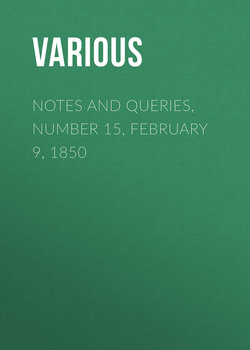Читать книгу Notes and Queries, Number 15, February 9, 1850 - Various - Страница 4
NOTES
SHAKSPEARE’S EMPLOYMENT OF MONOSYLLABLES
ОглавлениеI offer the following flim-flam to the examination of your readers, all of whom are, I presume, more or less, readers of Shakspeare, and far better qualified than I am to “anatomize” his writings, and “see what bred about his heart.”
I start with the proposition that the language of passion is almost invariably broken and abrupt, and the deduction that I wish to draw from this proposition, and the passages that I am about to quote is, that—Shakspeare on more than one occasion advisedly used monosyllables, and monosyllables only, when he wished to express violent and overwhelming mental emotion, ex. gratiâ:—
Lear. “Thou know’st the first time that we smell the air,
We wawl, and cry:—I will preach to thee; mark me.
[Gloster. “Alack! alack the day!]
Lear. “When we are born, we cry, that we are come
To this great stage of fools,—This a good block?”
—King Lear, Act IV. Sc. 6.
In this passage [I bracket Gloster] we find no fewer than forty-two monosyllables following each other consecutively. Again,
“– but through his lips do throng
Weak words, so thick come, in his poor heart’s aid,
That no man could distinguish what he said.”
Rape of Lucreece, Stanza 255.
After I had kept this among other flim-flams for more than a year in my note-book, I submitted it in a letter to the examination of a friend; his answer was as follows:—“Your canon is ingenious, especially in the line taken from the sonnet. I doubt it however, much, and rather believe that sound is often sympathetically, and as it were unconsciously, adapted to sense. Moreover, monosyllables are redundant in our tongue, as you will see in the scene you quote. In King John, Act III. Sc. 3., where the King is pausing in his wish to incense Hubert to Arthur’s murder, he says:—
‘Good friend, though hast no cause to say so yet:
But thou shall have; and creep time ne’er so slow,
Yet it shall come, for me to do thee good.
I had a thing to say,—But let it go:’—
forty monosyllables.”
“Credimus? an qui amant ipsi sibi somnia fingunt.”
The very passage he quoted seemed, to my eyes, rather a corroboration of the theory, than an argument against it! I might, I think, have quoted the remainder of Lear’s speech ending with the words “Kill, kill, kill, kill, kill, kill,” and, with the exception of three words, consisting entirely of monosyllables, and one or two other passages. But I have written enough to express my meaning.
C. FORBES.
Temple.
